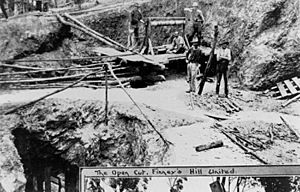Indooroopilly Silver Mine facts for kids
The Indooroopilly Silver Mine is an old silver mine located in Indooroopilly, a suburb of Brisbane, Australia. It's a place with a fascinating past, first as a working mine and later as a special training facility for university students.
Contents
Discovering Silver and Lead
In 1918, two neighbours, G. Olsen and Patrick J. Madden, found traces of silver and lead on Mr. Olsen's land. This land was on Finney's Hill in Indooroopilly, about 10 kilometres from the centre of Brisbane, Queensland.
After digging around and finding more promising signs, they were given permission to mine the area. The first rocks containing valuable minerals, called ore, were sent away to a place called Cockle Creek in New South Wales to be melted down and separate the metals.
Early Mining Operations
Because the first efforts were successful, they started building an underground shaft in 1919. This allowed them to begin open-cut mining, which means digging minerals from the surface. More mining permits were given for the land and nearby areas. A year later, in 1920, they used a special method called geophysical prospecting. This was the first time such a survey was recorded in Queensland!
In 1921, a larger shaft was dug to get more ore. By 1924, a small plant was built at the mine to help process the ore. Mining continued, and Patrick J. Madden eventually bought the entire property. The old house on the land, called Fernbrook, was taken down.
Why the Mine Closed
By 1929, the Indooroopilly Silver Mine stopped working. This happened for two main reasons:
- The price of metals around the world dropped, making it less profitable to mine.
- The best quality silver and lead in the mine had been used up.
Between 1919 and 1929, the mine produced a lot of metal. It yielded about 227,343 ounces of silver and 1,795 tonnes of lead.
The University of Queensland's Mine
For the next 20 years, the mine stayed closed. Over time, the wooden supports in the shafts and tunnels rotted, causing parts of the mine to collapse. The area also often flooded because it was close to the Brisbane River.
In 1951, The University of Queensland leased the mine site. It was about 6 hectares (the size of about 15 football fields) and was used by their Department of Mining. The land was first owned by the Brisbane City Council, who then sold it to the Queensland government. In 1956, the state government gave the mine site to the University. This gave them permanent and exclusive rights to use both the surface and underground parts of the mine.
A Working Classroom
The University reopened the open-cut and underground parts of the mine. This was a great chance for them to manage it as a real working mine and a teaching facility. Students could get hands-on experience!
There are three main shafts at the mine:
- The main shaft goes down about 290 feet (88 metres).
- A ventilation shaft goes down about 150 feet (46 metres).
- An inclined shaft goes down at a 65-degree angle to the mine's 140-foot (43-metre) level. This shaft was built by students from the Colombo Plan, an international program, to gain practical experience.
Today, the mine is still used as part of the Julius Kruttschnitt Mineral Research Centre. It continues to be an important place for learning about mining and minerals.
 | Isaac Myers |
 | D. Hamilton Jackson |
 | A. Philip Randolph |



